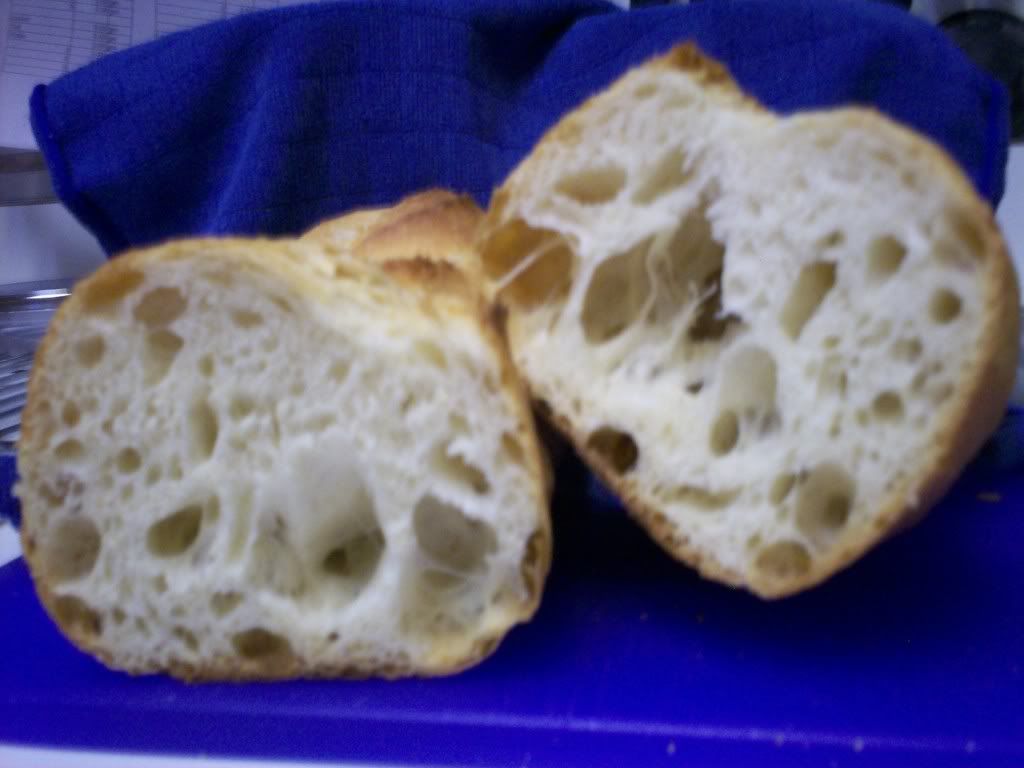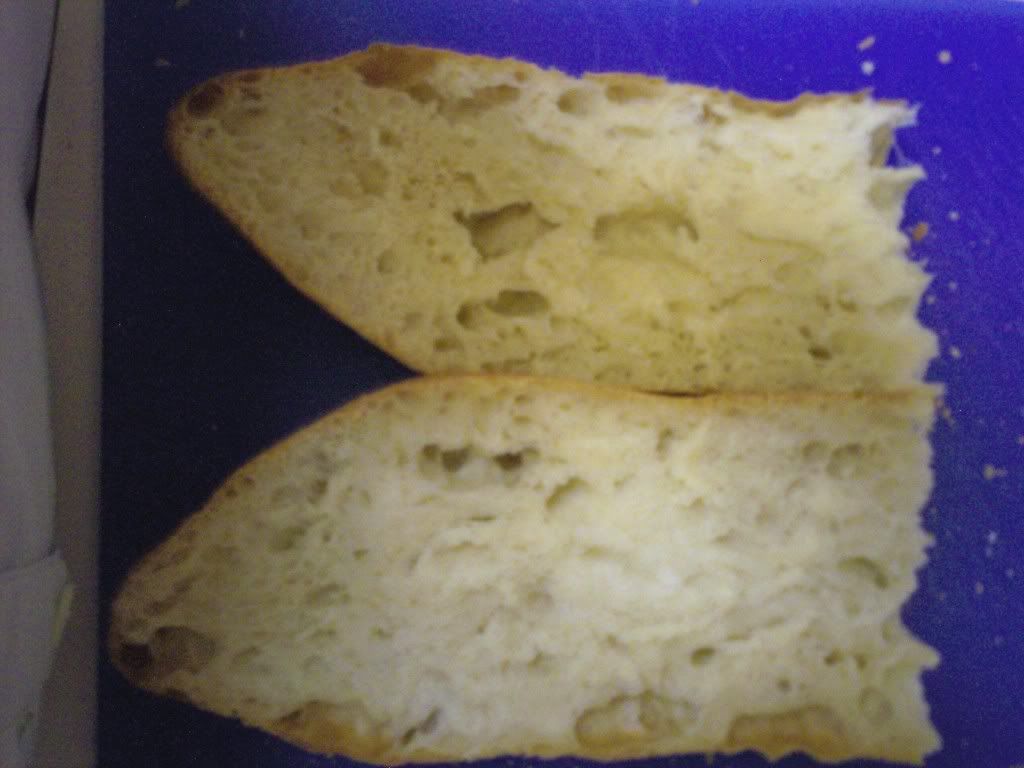Inspired by dmsnyder, I have been inching along on the challenge of making straight dough baguettes.
I'm still getting over the fast action of commercial yeast, so I will try not to enthuse too much.
This time I used my standard baguette formula (65% hydration) with 10% of my home milled high extraction flour and 90% King Arthur All Purpose. Instant yeast was used at .5%. I changed nothing else in the process - just the mix of flours
I tried the trick of turning off the oven, but chickened out at two minutes. The crust immediately out of the oven was very crackly, but did get softer as the baguettes cooled, but not nearly as much as the last batch.
This time I was able to concentrate on my scoring. The cooling baguettes are shown below. I don't want to k'vel, but I think they look pretty nice. I love this oven spring with commercial yeast! If anything they were a touch under proofed (gotta be me) but not by much. Oh, OK, a little uneven on a couple of slashes and some tearing.

And here are the money shots. The crumb.


Not bad. So much depends on where the slice hits, but not bad.
The taste? Again, lacking my little levain tang but pretty good. I would say a tad better than all white. The texture was fluffy. I'm sure that toasted tomorrow they will be very nice. Again, I would think this bread would be better in combination with "something else." I feel that it has a sweetness to it that David didn't taste.
Here are my observations on technique:
- I add the salt at the beginning of the process. I just don't think it makes a big difference and the voice in my head doesn't mock me about my irrational fear of salt.
- Leaving the loaves in the oven for even two minutes had a significant effect on the "crackliness" of the crust. Five minutes would be better.
- I'd like to try these with even less yeast. After 1 hour of bulk ferment these guys were definitely doubled. If I pulled down the yeast a bit, the bulk ferment would take longer and I might get a better flavor (remembering that we want to get our loaves in the oven in 4-6 hours.) My formula has about 1% less yeast than David's and this may have made a difference. From past experience, I think it did.
- I might (and I emphasize "might") up the hydration a bit. The dough did feel a little stiff. However I am standing firm that it is getting the fermentation correct, not just upping the hydration that creates the proper baguette crumb. I only feel that the hydration should be increased ever so slightly to compensate for the whole wheat.
- Folks who have watched me pre shape and shape dough remark on the quality of "the iron hand in the velvet glove" that I bring to my shaping (after years of practice). I could be gentler I guess, but the voice in my head tells me that this is not the major factor (once you get to the "iron hand in velvet glove" phase - I mean if you are treating your baguettes like a stress relief ball, you need to back off) and I agree. I think "gentle shaping" can be taken too far and this results in an unattractive end product.
- I would make sure I concentrate on my scoring as this does have an impact.
- I would steam normally. The extra steam will probably just mess up the scoring.
Well, that's quite a binge of baguette baking. I'm not prepared to give up my levains and pre ferments, but it's nice to know I can start a bread at noon and have it by dinner if I am pressed.
David, I hope these observations are useful.
- proth5's Blog
- Log in or register to post comments
Thanks for adding to the collective experience.
I wonder if your altitude contributes to your fast rise. The yeast in my formula was about 1% less than most baguette formulas I've seen. I did not get any yeasty flavor (which I do not like) with it.
And, FWIW, the second time I made these I did get a sweet flavor. I am wondering if which white flour I use makes a difference.
David
I've not noticed much difference in sea level vs my altitude rise. Mile High is right on the cusp of "high altitude" where breads are concerned. Actually, I believe that my bulk fermentation (1 hour - fold - 1 hour) was a bit longer than yours.
I've noticed that any time I work with the high extraction flour fermentation moves faster. I've actually changed my timings on my near whole wheat levain to be much less than my white levain. I suspect the high extraction flour is the culprit for the fast rise.
I'm trying a levain pre ferment with the addition of 0.25% of my new favorite plaything - commercial yeast - tomorrow. All white flour (got to get that baseline...) Wonder how that will go? I'll let you know.
Good on the sweet flavor. I am sure that the "brand" of white flour makes a difference in the taste because there is a lot of variablity in white flour and the specs to which it is ground/exact variety of wheat/wheat blends/etc. Do you have the specs on your different flours? Now that would be an interesting project for someone like me who has a slavish devotion to repeateble technique... (no no no no no no - can't get started on that)
and some days the bear gets you. The "hybrid" bread with 12% of the flour prefermented with an innoculation rate of 25% levain (65% hydration, .25% yeast) was an interesting bread.
It had a very mild levain tang, mildly open fluffy crumb and didn't quite have that fun oven spring of a straight dough. It's not a bad bread by any stretch of the imagination, but didn't really bring the "best of both worlds." I think the shortened fermentation does take a toll. Bulk fermentation was 1 hour/fold/1 hour - as for the straight dough. I was iffy on the final ferment - I may have left it go too long.
The doctors at "the place" tell me I should not create a permanent internet record of breads that don't make me mostly happy - or I'll have to go back there, so no pics.
I would be interested in other folks' inspiration on hybrid breads...